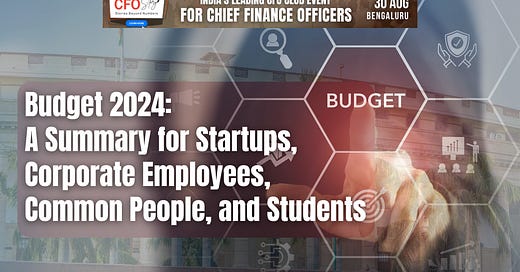Budget 2024: A Summary for Startups, Corporate Employees, Common People, and Students
By Razum Rajan
Startups: The 2024 budget underscores the government’s commitment to fostering innovation and entrepreneurship. Key highlights include:
Tax Incentives: Extended tax holiday for startups incorporated until March 31, 2025, and increased turnover limit for claiming tax benefits from ₹100 crore to ₹150 crore.
Ease of Doing Business: Simplification of compliance regulations and introduction of a single-window clearance system to streamline processes.
Funding and Support: Launch of a ₹10,000 crore fund of funds to facilitate venture capital and private equity investments in startups, alongside increased grants for incubators and accelerators.
Digital Infrastructure: Investment in expanding digital infrastructure, including high-speed internet in rural areas, to support tech startups and boost digital literacy.
Corporate Employees: The budget aims to improve the financial wellbeing and work-life balance of corporate employees through several measures:
Tax Relief: Standard deduction increased from ₹50,000 to ₹75,000, benefiting salaried individuals.
Workplace Benefits: Enhanced incentives for companies offering health and wellness programs, including mental health support and fitness memberships.
Skilling and Upskilling: Increased funding for professional development programs, emphasizing digital skills and leadership training.
Work from Home (WFH) Policies: Tax deductions for expenses incurred while working from home, encouraging flexible working arrangements.
Common People: The 2024 budget is designed to enhance the quality of life and economic stability for common people with the following initiatives:
Tax Reforms: Raised the income tax exemption limit from ₹2.5 lakh to ₹3 lakh, reducing the tax burden on the middle class.
Healthcare: Significant investment in public healthcare infrastructure, including the establishment of new hospitals and primary health centers.
Social Security: Expansion of social security schemes, including pensions and insurance for informal sector workers.
Affordable Housing: Increased allocation for affordable housing projects and introduction of interest subsidies on home loans.
Students: The education sector receives a substantial boost in this year’s budget, focusing on accessibility, quality, and employability:
Education Funding: Increased budget allocation for primary and secondary education, ensuring better infrastructure and resources.
Scholarships and Loans: Enhanced scholarship programs for meritorious and underprivileged students, alongside easier access to education loans with lower interest rates.
Digital Education: Investment in digital education platforms and resources to bridge the learning gap, especially in rural and remote areas.
Skill Development: Introduction of vocational training programs and partnerships with industries to equip students with job-ready skills.
This budget aims to create a balanced and inclusive growth environment, ensuring that each group benefits from India’s economic progress.






